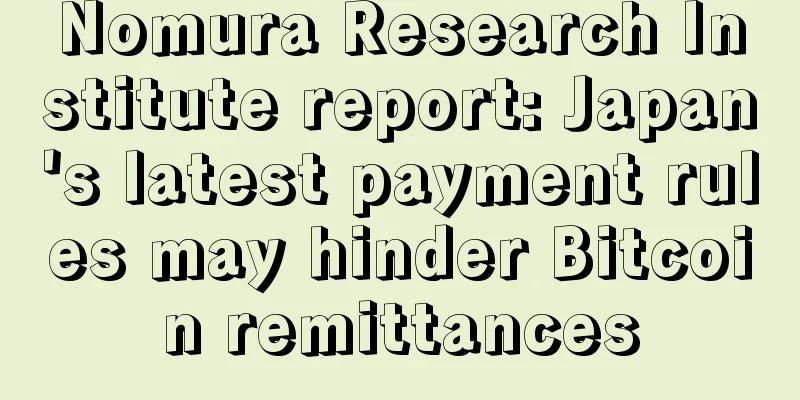Nomura Research Institute report: Japan's latest payment rules may hinder Bitcoin remittances

|
Rage Commentary : NRI Senior Advisor Yasutake Okano wrote the Nomura Research Institute (NRI) report, which focuses on the Payment Services Act (PSA), which was passed by the Japanese legislature in May. Under the existing anti-money laundering law and know-your-customer rules, domestic bitcoin exchanges were established in Japan, classifying digital currencies as prepaid payment tools. Although the PSA stipulates digital currency remittances, the maximum remittance amount cannot exceed 1 million yen (US$9,557), which will hinder cross-border transaction remittance services. Translation: Nicole A recent Nomura Research Institute (NRI) report argues that despite the latest regulatory regime for Bitcoin and digital currencies, more classification is needed for innovators working on blockchain technology in Japan. The report, prepared by senior adviser Yasutake Okano, focuses on the Payment Services Act (PSA), which the Japanese legislature passed in May. After months of discussion, the bill will allow domestic bitcoin exchanges to classify digital currencies as prepaid payment instruments under existing anti-money laundering laws and know-your-customer rules. But Okano believes that the PSA revision does not go far enough, and further updates to the country’s banking act as well as the financial instruments and exchanges act should clarify whether other potential blockchain use cases can be developed. For example, the report suggests that while the PSA regulates digital currency remittances, the maximum remittance amount cannot exceed one million yen (or $9,557), which is a restriction for prepaid instruments. "The one million yen transaction limit in the PSA will hinder payment services in cross-border transactions," the report said. Okano said there should be clearer definitions of digital currencies, such as how they should be regulated under national tax laws, and he said such a move would bring Japan’s regulations in line with the European Court’s decision. He wrote that while Japanese tax law exempts certain transactions of currency, checks and bills, it does not yet apply to Bitcoin and other digital currencies. “This still needs a lot of discussion,” Okano said. Elsewhere, the report found that new regulations could be a “barrier to entry” for digital currency trading firms, but any such drawbacks could be tempered by consumer trust and adoption. |
<<: Dutch asset management services firm explores blockchain technology
>>: JPMorgan Chase says it will focus on exploring blockchain applications in trade finance
Recommend
What if there is a mole on the upper part of the face?
We always hope that our life will be smooth saili...
What does a man with a big nose mean?
What does a man with a big nose mean? 1. Is it go...
What influence do moles on your hands have on your life?
People with moles on their hands have very good f...
Physiognomy teaches you how to win over a man!
Love is a repetitive alternation of emotions, wav...
Are women with three white eyes available to everyone?
Three white eyes are a kind of eye shape, but acc...
What does reverse phoenix eyes mean in physiognomy?
What does reverse phoenix eyes mean in physiognom...
What kind of palm lines will bring good luck to your husband?
Eight-character marriage guide, predict your marr...
What are the characteristics of a poor woman?
The thing people fear most in their life is pover...
Moles on boys' faces, what does it mean when there are moles on their facial features?
In the field of physiognomy, a person's facia...
Do women with high foreheads have the best fortune? Do women with high foreheads have good fortune?
Women with high foreheads tend to have a quick te...
Is the alt season over? Bitcoin ETFs will rewrite cryptocurrency investment strategies
Bitcoin exchange-traded products may have fundame...
What does a mole on a woman's nose mean? Is it good for a woman to have a mole on her nose?
The nose is a vital part of a person's appear...
Sydney firms Kyckr and Identitii.com back blockchain to fight terror finance
Rage Review : Two small companies in Sydney, Kyck...
Yunbi.com Laomao: What is behind the madness of Ethereum?
On May 18, Yunbi.com COO Lao Mao (Weibo ID: @大白老猫...
What does it mean that a person will be poor for life if there is a mole on his back? What does it mean if there is a mole on the back?
Many old people like to say, "If a person ha...









